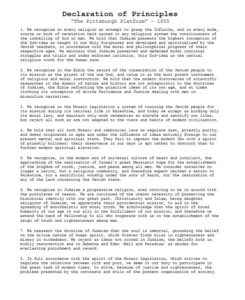The Pittsburgh Platform – Defining American Reform Judaism (1885)
On November 16-19, 1885, a meeting of the convened at the call of Kaufmann Kohler. The meeting produces the “Pittsburgh Platform” – a document which set forth American Reform positions on such topics as the idea of God, the Jewish mission, and the need for Jews to be actively involved in social justice causes for the betterment of humankind. This famous platform is considered to be a landmark development in the history of American Judaism. Isaac Mayer Wise presides.
This convention, called in 1885, represented the diverging customs and traditions of Eastern European and German immigrants as they interacted in the United States. The Pittsburgh Platform, which they created together, produced and disseminated eight principles that until 1937 defined the American Reform Movement.
1) Judaism holds the “highest conception of the Godidea” and represents the root belief in an “Infinite” of all monotheistic religions.
2) That “the modern discoveries of scientific researches in the domain of nature and history are not antagonistic to the doctrines of Judaism.”
3) Halachic laws “not adapted to the views and habits of modern civilization” can be rejected.
4) Such laws to be rejected include kashrut (the act of keeping kosher) and rules over one’s dress. Such codes are “apt rather to obstruct than to further modern spiritual elevation.”
5) The stance of the Reform Movement is against modern political Zionism. The Platform states, “we consider ourselves no longer a nation, but a religious community, and therefore expect neither a return to Palestine, nor the restoration of any laws concerning the Jewish state.”
6) A call of fellowship to other monotheistic religions.
7) The seventh principle rejects the afterlife.
8) A call to action for moral responsibility. The Platform accentuates, “In full accordance with the spirit of the Mosaic legislation, which strives to regulate the relations between rich and poor, we deem it our duty to participate in the great task of modern times, to solve, on the basis of justice and righteousness, the problems presented by the contrasts and evils of the present organization of society.”
These tenants held as markers of American Reform Judaism until they were reevaluated in 1937 with the “Columbus Platform.”


